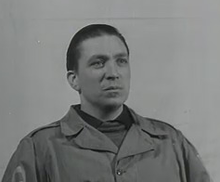Karl Sommer (SS member)


Karl Sommer (born March 25, 1915 in Cologne ; † unknown) was a German SS-Hauptsturmführer . Sommer was indicted in the Nuremberg trials and convicted as a war criminal.
Biography until 1945
Sommer joined the SS in early May 1933 and was not a member of the NSDAP . After the outbreak of World War II , Sommer was assigned to the Waffen SS , but was released there in spring 1941 after a foot injury. In March 1941, Sommer was transferred to Deutsche Erd- und Steinwerke GmbH , where he worked in the department for the labor deployment of concentration camp prisoners. From October 1941, Sommer headed this department. At the beginning of May 1942 he was transferred to the Main Economic and Administrative Office (WVHA), where he headed Department D II-1 (prisoner deployment) until the end of the war. From the end of 1943 onwards, Sommer was Gerhard Maurer's deputy head of department D II in the WVHA . In the SS, summer 1944 reached the rank of SS-Hauptsturmführer . At the end of the war he fled via the so-called Rattenlinie Nord to Flensburg .
After the end of the war
After his arrest, Sommer was indicted with 17 other accused from January 13, 1947 before the United States Military Tribunal II in the process of Economic and Administrative Main Office of the SS . Sommer was particularly accused of being responsible for the organization of forced labor in the concentration camps and the resulting crimes. Sommer was found guilty of war crimes , crimes against humanity and membership in criminal organizations and sentenced to death on November 3, 1947. Thereafter, the sentence was reduced to life imprisonment and later commuted to a twenty-year sentence. After serving a partial sentence, he was released on December 11, 1953 from the Landsberg War Crimes Prison in Frankfurt am Main . Then he worked as a businessman in Lower Saxony .
literature
- Ernst Klee : The dictionary of persons on the Third Reich . Who was what before and after 1945 . 2nd Edition. Fischer-Taschenbuch-Verlag, Frankfurt am Main 2007, ISBN 978-3-596-16048-8 .
- Jan Erik Schulte : Forced Labor and Extermination. The economic empire of the SS. Oswald Pohl and the SS-Wirtschafts-Verwaltungshauptamt 1933–1945. Schöningh, Paderborn et al. 2001, ISBN 3-506-78245-2 (also: Bochum, Univ., Diss., 1999).
- Records of the United States Nuremberg War Crimes Trials , Vol. V. United States Government Printing Office , District of Columbia 1950. (Volume 5 of the " Green Series ")
Individual evidence
- ^ A b Jan Erik Schulte: Forced Labor and Destruction: The Economic Empire of the SS. Oswald Pohl and the SS Economic Administration Main Office 1933-1945. Paderborn 2001, p. 477
- ^ A b Records of the United States Nuremberg War Crimes Trials , Vol. V. District of Columbia 1950, pp. 1031ff.
- ↑ a b c Ernst Klee: Das Personenlexikon zum Third Reich , Frankfurt am Main 2007, p. 144.
- ↑ Stephan Link: "Rattenlinie Nord". War criminals in Flensburg and the surrounding area in May 1945. In: Gerhard Paul, Broder Schwensen (Hrsg.): Mai '45. End of the war in Flensburg. Flensburg 2015, p. 22.
- ^ Jan Erik Schulte: Forced Labor and Destruction: The Economic Empire of the SS. Oswald Pohl and the SS Economic Administration Main Office 1933-1945. Paderborn 2001, p. 433
- ↑ Johannes Tuchel, The Inspection of the Concentration Camps 1938–1945, Berlin 1994, p. 217
| personal data | |
|---|---|
| SURNAME | Summer, Karl |
| BRIEF DESCRIPTION | German SS leader and convict of the Nuremberg trials |
| DATE OF BIRTH | March 25, 1915 |
| PLACE OF BIRTH | Cologne |